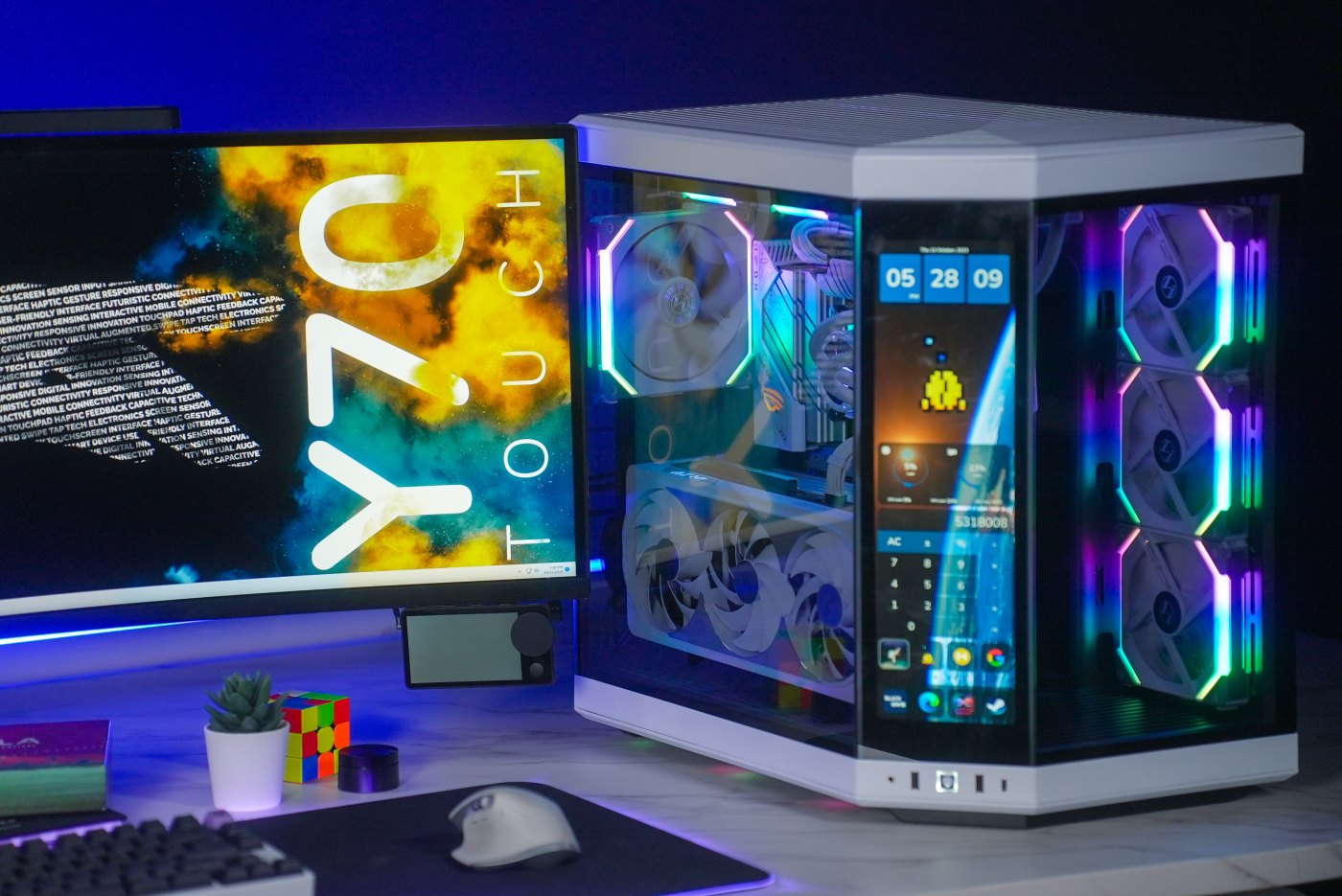I’ve spent an absurd amount of time and money on my gaming rig. I originally built a custom liquid-cooled PC during the pandemic and enjoyed the outstanding performance, quiet acoustics and the beautiful look of the machine. Unfortunately, it didn’t last. Disaster struck and my PC sprung a leak, and after much panicking, I salvaged what I could.
Somehow my motherboard and other parts survived except for the graphics card. I bought a new one, and learning my lesson, I opted for an air-cooled machine. The one glaring issue for my recovered rig was the case. It was a smallish Corsair 4000x that was fine for water cooling but wasn’t the best for my new solution. My rig needed more room to breathe, and the Hyte Y70, which the company sent over. It offered more space and a slew of other upgrades.
I made a custom loop to liquid cool PC and it was heavenly until my gaming rig sprung a leak. (Gieson Cacho/Bay Area News Group)
THE HOT NEW TREND
The Hyte Y70 follows a trend in enthusiast PC cases. Boxy rigs with one glass side panel are out, and fish tank-looking machines are in. The stylish cases feature glass sides on half the walls, and that lets gamers show off multicolored fans or other design choices that make their rig stand out. The glass cases are also bigger to accommodate the latest accouterments, including GPUs that have grown larger with each new generation. That expansive nature also means there’s better airflow, which is key for cooling rigs.
Although the larger space is helpful, Hyte did more to enhance the case for PC builders. They built the Hyte Y70 with easy access for up to 10 fans and plenty and holes and grommets so that users can connect power supply unit cables and other wires easily on the motherboard. When done right, builders create a clean look in the case interior and more importantly improve the air flow.
The Hyte Y70 will occupy more space on your desk but it will have better cooling than other cases. (Gieson Cacho)
The buttons are placed on the bottom of the case, making it easier to access for those who keep their PC sitting next to them on their desk. Again, this case is designed to showcase the PC parts and the other flair. It’s a godsend for those who love to put RGB lights and even action figures in their rig.
I approached the case switch with trepidation. It’s still easier than building a PC from scratch, but it still takes time and care. The whole process took me about six hours, but that was after innumerable trials and errors. Here are the five things I learned about the process:
1. Photograph and document everything from your previous rig: Before stripping your PC and moving it to the new case, take photos of everything on the inside with your phone. Users should capture which wires go to what ports. Users should pay special attention to everything connected to the PSU. Meticulously documenting how you disconnect your PC will help tremendously when you have to put it together in the new case.
2. Plan out your wiring and fan placement beforehand: I liked how the Hyte Y70 naturally groups fans together on the side, bottom, top and back of the case. Users should plan out how fans are blowing air in and out of the case before adding the devices on the case. Normally, the side and bottom are used for intake ie. blowing air into the case and the top and back are for blowing the warming air out of the case to keep the parts cool. To organize the wires better, arrange the fans so that the wires exit near the case grommets.
Related Articles
‘Balatro’ highlights Apple announcement of App Store Award winners
Fortnite players ‘tricked’ into unwanted purchases are getting refunds. Here’s how
Review: ‘Indiana Jones and the Great Circle’ finally gives fans what they want
Holiday gift guide: Here’s what to buy for a gamer who has everything
‘Monster Hunter Now’ season 4 introduces Tigrex and Switch Axe
3. When handling the case, be careful with the pieces: One of the dangers of having a fish tank case is that users are dealing with a lot of glass. One wrong move and a key piece can shatter. Thankfully, the Hyte 70 has toolless panels so that you can remove key parts more easily if you need to fine-tune the internals. The glass side is easy to pull out while the front and angled panel are more difficult. Before working, make sure you take that glass out so you don’t accidentally crack it while installing the motherboard or other pieces.
4. Put in the GPU last: This was one of the more annoying parts of dealing with Hyte 70. The case came with easy-to-follow instructions, but it loses nuance with just a flowchart of pictures. A major issue I dealt with while following the Hyte directions was that I put on the graphics card too soon. The case comes with a vertical GPU slot.
It’s a perk that the old Corsair case didn’t have and it’s helpful, especially with today’s graphics cards. The only problem is that the vertical slot covers up access to key motherboard ports. I constantly had to install and remove the graphics card because I forgot to connect one plug or another. The lesson I learned is that it’s best to get that out of the way and then add the GPU.
During the build process, I discovered new ways to fine-tune my gaming rig inside the Hyte 70. It looks like a mess now but I have plants to make it better. (Gieson Cacho/Bay Area News Group
5. Not everything has to be perfect immediately: Sometimes it’s better to just have a gaming rig up and running and clean up the installation later. Throughout the PC case switch, I found plenty of areas for improvements. I could clean up the wire management and tweak some of the fan placement, but all of this would cost more time and money.
Sometimes, it’s just best to make sure the machine is working properly and the upgrade works rather than perfecting it. It took a lot of effort to make sure the whole endeavor worked, and in the end, it was a huge improvement for my gaming rig. It ran cooler and games were much less likely to crash.
The Hyte Y70 is on sale this holiday season for $199. The case also has an optional $199 touch-screen panel that adds to the cost, but provides another way to trick out the gaming rig. It features widgets that updates gamers on the PC’s temperature and other diagnostics. It’s also another way to customize your PC’s look.












